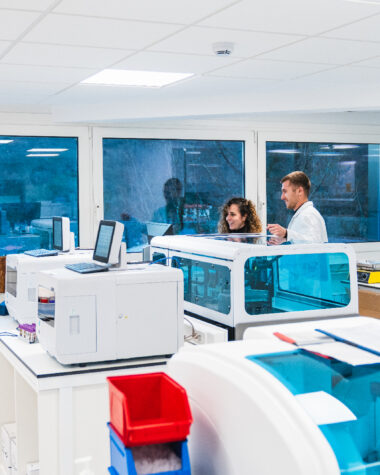BioTech Health X works to deliver the latest coverage and updates in the biotechnology sector. This includes providing additional insight beyond market news and press release updates. One of those areas of focus is the BioTech Health X CEO Series where our team offers 5 simple questions that allow biotech executives the ability to explain who their company is, what they do and provide additional commentary about the work they are doing.
The first in the series is Virios Therapeutics CEO Greg Duncan. Virios Therapeutics (NASDAQ: VIRI) is a clinical-stage biopharmaceutical company developing and commercializing innovative antiviral therapies to treat diseases associated with a viral triggered abnormal immune response, such as fibromyalgia (FM). The company is led by an executive team highly experienced in the successful development of therapies
for FM. Its lead candidate, IMC-1, was granted fast track designation by the FDA.
Greg Duncan is the Chief Executive Officer and Chairman of the Board of Directors of Virios Therapeutics. Previously, Mr. Duncan was President and Chief Executive Officer of Celtaxsys, Inc., a privately held biotech company focused on developing anti-inflammatory medicines for rare disease where he scaled the required capital to build out the organizational capability to advance both pre- clinical and clinical development candidates. Prior to Celtaxsys, he served as an Executive Committee member at Belgium based UCB, a specialty pharma entity developing and commercializing medicines for immunologic and central nervous system disorders.
Before joining UCB, Mr. Duncan, while at Pfizer he held several executive U.S. and international appointments, including President of Pfizer’s $2B Latin America Operations and SVP of Marketing. His operational teams had accountability for the launches of many pharmaceutical brands including Lipitor, Zoloft, Viagra, Celebrex, Aricept, Lyrica, Cimzia, Zithromax (ZPack), Diflucan, Sutent, Rebif and Vimpat. Mr. Duncan has served as director for Biotie Therapeutics, the American Psychiatric Foundation, Bio International Organization (BIO), Southeast BIO (SEBIO and the Georgia Bio industry association groups. Greg holds a master’s degree in business administration from Emory University in Atlanta, GA, and a bachelor’s degree in economics from the State University of New York in Albany, NY.
1: For those not familiar with all of the great work that you have been doing, can you give us a brief overview of your lead candidate IMC-1, which was granted fast track designation by the FDA?
Virios Therapeutics, Inc. is a development-stage biotechnology company focused on advancing novel antiviral therapies to treat diseases associated with a viral triggered abnormal immune response. Overactive immune response related to activation of tissue resident Herpes Simplex Virus-1 has been postulated to be a potential root cause of chronic illnesses such as fibromyalgia, irritable bowel disease, chronic fatigue syndrome and functional somatic syndrome, all of which are characterized by a waxing and waning manifestation of disease. Our lead development candidate is IMC-1, a novel, proprietary, fixed dose combination of famciclovir and celecoxib, designed to synergistically suppress HSV-1 activation and replication, with the end goal of reducing viral mediated disease burden. We are unaware of any other antivirals in development for the treatment of FM. This novel approach was a germane consideration in FDA designating IMC-1 for fast-track review status for the treatment of FM.
The potential of IMC-1 in fibromyalgia is underpinned by statistically significant improvement versus placebo in the primary endpoint of pain reduction in a double-blinded, placebo-controlled, randomized Phase 2a proof-of-concept study in FM patients. In this study, IMC-1-treated FM subjects experienced statistically significant clinical effects on both primary endpoints of pain assessment and secondary endpoint measures of pain reduction, reduction in fatigue, reductions in anxiety, depression and improvement in patient functioning and overall global health status. Patients treated with IMC-1 demonstrated lower discontinuation rates due to adverse events as compared with placebo treated patients, which we believe could be a major differentiating feature of IMC-1 given the current patient dissatisfaction related to poor tolerability of the existing medications.
2a: Congratulations on the recent news of the dosing of the first patient in your Phase 2b Trial. What are the details of this Phase 2 trial & what are the goals you are hoping to achieve?
The ongoing phase 2b trial has been designed in concordance with the requirements of a Phase 3 program. This trial will include 460 female patients treated for 16 weeks and features further optimized dosages of IMC-1. The primary endpoint used in the ongoing Phase 2b trial, daily assessment of pain reduction as measured by the NRS-24 recall assessment, is exactly the same endpoint we used in our successful Phase 2a trial. We expect top line results from this 16-week trial in mid-2022.
If this trial is successful, we will engage the FDA to decipher the exact requirements for IMC-1 Phase 3 development. Given the concordance of the Phase 2b trial with Phase 3 requirements, we will endeavor to make the case, albeit dependent on the data, that only one Phase 3 trial will be required for approval.
2b: If successful, how will those with Fibromyalgia be impacted?
Fibromyalgia is a widespread chronic pain disorder including severe symptoms of fatigue that can last for 3 months or longer. It is also characterized by generalized aching, muscle stiffness, non-restorative sleep, chronic fatigue, depression, cognitive impairment and disturbances in bowel function. Fibromyalgia patients have a three times greater risk of committing suicide, almost one in two miss work as a result of their disease and significant numbers of patients are treated with opioids, a bad fact for any patient with fibromyalgia.
Researchers estimate that FM affects 2% to 8% of the US population and is the second most common “rheumatic disorder,” second to osteoarthritis and the National Fibromyalgia & Chronic Pain Association estimates that 10 million Americans have FM.
There is a very significant need for better FM therapies as reflected by the large untreated pool of currently diagnosed FM patients. Despite a very high disease burden, just over one in two (56%) patients currently diagnosed with FM are actively being treated with prescription medication. Furthermore, there are only three medicines approved to treat FM, reflecting limited treatment options available to FM patients.
The profile of IMC-1 that has emerged in clinical trials to date, suggests that IMC-1 is effective at controlling fibromyalgia patient’s pain, reduces fatigue, anxiety and depression, and improves patient sleep, over functionality and global health status. Furthermore, in clinical trials executed to-date, IMC-1 was better tolerated than placebo, suggesting the tolerability profile of IMC-1 could be a major differentiating feature on IMC-1 therapy. While effective at treating the pain component of FM, the three approved medications (pregabalin, duloxetine, and milnacipran) can give rise to a side-effect burden which limits their use.
3: We see a lot of emerging biotechnology companies come and go in our field. Very few of them have such an experienced Board of Directors and Management team like you do at Virios. How did you assemble such a talented team?
We have been fortunate to assemble a board of directors and a management with extensive experience in developing and commercializing category leading medicines, including antiviral therapies, including two of the three FDA approved fibromyalgia therapies.
I believe there are three reasons we have been able to attract such a high-quality cadre of directors. First, all of our directors recognize the need for new, safe and effective fibromyalgia therapies. Second, we have a novel, combination antiviral treatment approach to address the needs of fibromyalgia patients and this approach is supported by both mechanistic and clinical data. Last, all of our directors believe this combination antiviral mechanism holds potential to address other chronic debilitating conditions, such and irritable bowel syndrome and fatigue related disorders.
In short, our leadership team and board are well positioned to adroitly advance development of IMC-1 to treat FM, as well as other somatic syndrome disorders.
4: Historically few drugs have focused on a cure but rather just on treating the disease. Some cancer drugs for example often are used for immunotherapy and not their initial cancer treatment. What are the other ideas or projects in the pipeline for Virios Therapeutics?
Beyond fibromyalgia, we believe there are viral mediated immune response conditions with significant morbidity and mortality that may benefit from antiviral focused therapy. These conditions include IBS, chronic fatigue syndrome and other functional somatic syndromes, all of which are characterized by a waxing and waning manifestation of disease. There are limited options to address the underlying cause of these conditions, with most presently used medications treating the symptoms associated with these disease.
Our scientific team is presently engaged with leading gastroenterologists to develop a Phase 2a IBS proof of concept study as a complement to the FM program.
If our exploratory work with several of the world’s leading virologists reveals the potential of IMC-1 to treat patient populations in one or more of these rare inflammatory conditions, we intend to advance IMC-1 into Phase 2 clinical development to expand the value proposition of IMC-1 beyond FM.
5: Where do you see the company in the next 5 years?
Presuming success in our IMC-1 fibromyalgia Phase 2b trial, we believe we have significant optionality moving forward. If the Phase 2b trial results are consistent with our recently completed Phase 2a trial, we will confer with FDA to align on Phase 3 requirements. At the same time, we will evaluate external partnership interest in assisting in further advancement of IMC-1 development. We will then progress the approach that maximizes value for both patients and shareholders, be that alone or in conjunction with a strategic partner. Our ultimate goal is to advance treatment standards for the hundreds of millions of patients worldwide who suffer from the debilitating consequences of fibromyalgia, and other virally mediated chronic conditions.








